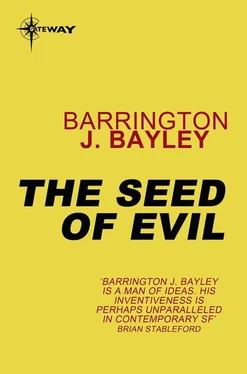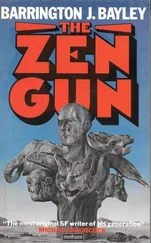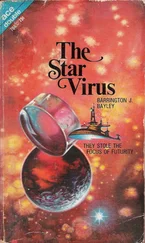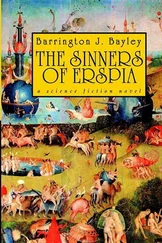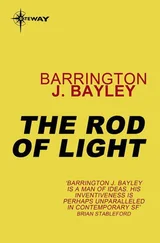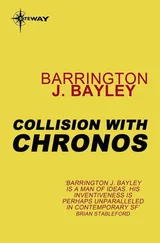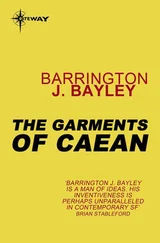Barrington Bayley - The Seed of Evil
Здесь есть возможность читать онлайн «Barrington Bayley - The Seed of Evil» весь текст электронной книги совершенно бесплатно (целиком полную версию без сокращений). В некоторых случаях можно слушать аудио, скачать через торрент в формате fb2 и присутствует краткое содержание. Город: London, Год выпуска: 2012, ISBN: 2012, Издательство: Gateway, Жанр: Фантастика и фэнтези, на английском языке. Описание произведения, (предисловие) а так же отзывы посетителей доступны на портале библиотеки ЛибКат.
- Название:The Seed of Evil
- Автор:
- Издательство:Gateway
- Жанр:
- Год:2012
- Город:London
- ISBN:978-0-575-10220-0
- Рейтинг книги:4 / 5. Голосов: 1
-
Избранное:Добавить в избранное
- Отзывы:
-
Ваша оценка:
- 80
- 1
- 2
- 3
- 4
- 5
The Seed of Evil: краткое содержание, описание и аннотация
Предлагаем к чтению аннотацию, описание, краткое содержание или предисловие (зависит от того, что написал сам автор книги «The Seed of Evil»). Если вы не нашли необходимую информацию о книге — напишите в комментариях, мы постараемся отыскать её.
, here is a second collection of endlessly inventive stories by Barrington J. Bayley; dark fables resounding with sombre undertones—love used as a weapon, God assassinated by the ingenuity of man, the secret of death revealed, the inexplicable explained! Tales which will be pondered on, and remembered.
The Seed of Evil — читать онлайн бесплатно полную книгу (весь текст) целиком
Ниже представлен текст книги, разбитый по страницам. Система сохранения места последней прочитанной страницы, позволяет с удобством читать онлайн бесплатно книгу «The Seed of Evil», без необходимости каждый раз заново искать на чём Вы остановились. Поставьте закладку, и сможете в любой момент перейти на страницу, на которой закончили чтение.
Интервал:
Закладка:
Our adversaries were short, shadowy figures in bulky armour; humanoid, but with an odd serpentine slant to their bodies. Without pause, they fired, and Joule fell with a ruined right side, bringing down the foremost raider as he did so.
From the corner of the cabin, I disposed of the other two.
That was the last we saw of the sub-surface raiders. We never knew why they discontinued the attack, for our detectors were a mass of ruined equipment, and from that time we have never seen outside.
As the other officers came into the control cabin I moved Joule to a couch. His breathing was quick and shallow, and his face was hardened against pain.
“I’m done,” he whispered.
I put an arm beneath his shoulders and propped him up gently. He was weak, but his eyes were full of intelligence. “Joule,” I pleaded, “what’s happening to us down here?”
“This is my theory,” he said, speaking with difficulty. “Matter is a distortion of space. As matter becomes more concentrated… so the space it occupies becomes more concentrated.”
He stopped, and for a moment I thought he had spoken his last. Then he seemed to revive somewhat, and continued.
“Within the Earth, space itself is compressed in proportion to density. What from the surface looks like an inch, might really be a thousand miles. The Earth’s radius is the same at all levels—we shrink as we enter denser matter, so it always looks the same. There’s always the same distance to go.”
His eyes grew dull, then glazed. As he died, I laid him down.
And I am in command of the Interstice . I lost no time in taking what little action was necessary. The hull is sealed, all internal hatches have been closed and the lights dimmed to conserve power. The propulsors are set for greatest economy and speed: our prime concern is to maintain the polariser field for a long, steady drop towards the centre. Our power plant is theoretically inexhaustible—but the space within the Earth may be as great as the entire solar system for all we know.
I do not think, now, that there is any mode of travel more sinister than that of a ship moving through solid matter. The deeper we sink, the greater is my awareness of the thousands of miles of rock over our heads, the more intense is the feeling of oppression. My conscience burdens me. It was I who persuaded Captain Joule to embark on the dive, and as I sit in the semi-darkness of this steel hull, I cannot help but think that I have persuaded my companions into Hell itself.
The ship is a shambles. Men lie in utter silence throughout her length, the seismo-beams no longer manned. We have all accepted the idea that we will not survive this voyage.
This is the story. Now I sit down to write it, so that those who find our ship when she finally emerges on the other side of the world—the polarisers will automatically be inactivated at that moment—may know of the nature of the Earth’s interior….
According to the farmer who claimed to have witnessed the event, the ship had come out of the hillside, then slithered twenty feet before coming to rest against an outcropping of rock.
Bain could readily see the truth of the latter part of the story from the broken saplings which marked the vessel’s path, but the first part strained his imagination, specially as there was no sign of a break in the turf. He was a specialist in ancient civilisations, and since he could find not one familiar detail in the vessel whose five-hundred-foot bulk loomed over him, he inclined to the view that it came from a different direction altogether.
“It must be a spaceship,” he said to the metallurgist who had come with the team from Sydney. “It couldn’t be anything else. That farmer was lying, or mistaken.”
The metallurgist nodded. “I would think so too,” he replied, “but I can’t imagine why it should be so old. Look at the way it sags all over the place! Know what that is? Metal fatigue. Yet some of the alloys I don’t recognise!”
Bain flicked through the metal-leaved book they had taken from the control room. For him, it provided almost irrefutable proof that the ship was from the stars: it appeared to be some sort of log, but its weird script bore absolutely no resemblance to any Earthly language, ancient or modern.
“We’ll never find a Rosetta Stone for this,” he thought. It saddened him to think that the account would never be translated.
At that moment Professor Wilson levered himself out of a hatch from inside the vessel and came over to them excitedly. “It’s a spaceship all right,” he said. “There’s an instrument in there that measures distance in terms of electromagnetic frequencies. Any physicist could read it from here to Andromeda.
“Do you know what distance that meter clocked before it ran out? Nearly eleven light-years!”
Man in Transit
My name is Untuar Murti, and having spent all my life in airplanes, apart from short intervals of hours and minutes, I am better qualified than most to judge the state of the world. True, my experience of it is slight; but that is all to the good: it means that my understanding has not been attenuated or compromised by too close an involvement in life.
This paper comprises, if you like, my last will and testament—not that I hope that anyone will find time to read it. As to myself: “Murti” was my father’s family name, while “Untuar” has no meaning or derivation but was invented by my father on the principle that it should lack any history or connection with anything else. That, he claimed, was most descriptive of my situation and thus the perfect name for his first, and only child. Let me add that the bitterness which tinged his attitude is not shared by me: the life into which one is born is naturally accepted without rancour, and I have known no other.
My recollection of my parents is unusually sharp—due, no doubt, to the fact that no one has taken their place in my life—if one considers that I was only five years old at the death of my mother, and only eight at the death of my father. They were docile, rather harmless people who were somewhat prone to miscalculation. Their early deaths may be attributed to an inability to adjust to the ordeal which an adverse fate had thrust upon them.
Fortunately enough the circumstances of my own birth are unique. I was born on board an airliner flying from Nairobi to London; I was not, however, permitted to disembark either at the port of arrival or at the port of departure. I have been travelling the same route ever since—a total of thirty-eight years.
My aerial imprisonment disappointed my parents, naturally, but it came as no great surprise to them because they had already been suffering the same indignity for several months. In those days, when the affairs of the world were less settled or rigidified than they are now, large numbers of people were occasionally trapped in pernicious political antinomies. Let me explain: my own parents were of Indian stock, holders of British passports, and residents of East Africa where their families had lived for two generations. Into this heterogeneity of allegiances, arising from the dismantling of a once far-flung empire, the government of their resident country dropped a calamity: seized by a convulsion of nationalism, it pronounced measures against all its “non-citizens”, making it impossible for them to earn a livelihood there. Understandably, the victims of this decision made moves to repair to their putative homeland, the British Isles, there being nowhere else for them to go. Alas, the moral qualities of that previously great nation must already have declined considerably by then; with open impudicity the British government revoked the official passports it had earlier issued, disowning all its guarantees, and turning away all who presented themselves for entry.
Читать дальшеИнтервал:
Закладка:
Похожие книги на «The Seed of Evil»
Представляем Вашему вниманию похожие книги на «The Seed of Evil» списком для выбора. Мы отобрали схожую по названию и смыслу литературу в надежде предоставить читателям больше вариантов отыскать новые, интересные, ещё непрочитанные произведения.
Обсуждение, отзывы о книге «The Seed of Evil» и просто собственные мнения читателей. Оставьте ваши комментарии, напишите, что Вы думаете о произведении, его смысле или главных героях. Укажите что конкретно понравилось, а что нет, и почему Вы так считаете.
